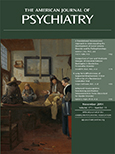Comparison of Low and Moderate Dosages of Extended-Release Quetiapine in Borderline Personality Disorder: A Randomized, Double-Blind, Placebo-Controlled Trial
Abstract
Objective:
The authors compared the efficacy and tolerability of low and moderate dosages of extended-release quetiapine in adults with borderline personality disorder.
Method:
Ninety-five participants with DSM-IV borderline personality disorder were randomly assigned to receive 150 mg/day of quetiapine (the low-dosage group; N=33), 300 mg/day of quetiapine (the moderate-dosage group; N=33), or placebo (N=29). Total score over time on the clinician-rated Zanarini Rating Scale for Borderline Personality Disorder (“Zanarini scale”) was analyzed in a mixed-effects model accounting for informative dropout.
Results:
Participants in the low-dosage quetiapine group had significant improvement on the Zanarini scale compared with those in the placebo group. Time to response (defined as a reduction of 50% or more on the Zanarini scale total score) was significantly shorter for both the low-dosage quetiapine group (hazard ratio=2.54, p=0.007) and the moderate-dosage quetiapine group (hazard ratio=2.37, p=0.011) than for the placebo group. Among participants who completed the study, 82% in the low-dosage quetiapine group were rated as “responders,” compared with 74% in the moderate-dosage group and 48% in the placebo group. Treatment-emergent adverse events included sedation, change in appetite, and dry mouth. The overall completion rate for the 8-week double-blind treatment phase was 67% (67% for the low-dosage quetiapine group, 58% for the moderate-dosage quetiapine group, and 79% for the placebo group). Participants who experienced sedation were more likely to drop out.
Conclusions:
Participants treated with 150 mg/day of quetiapine had a significant reduction in the severity of borderline personality disorder symptoms compared with those who received placebo. Adverse events were more likely in participants taking 300 mg/day of quetiapine.



